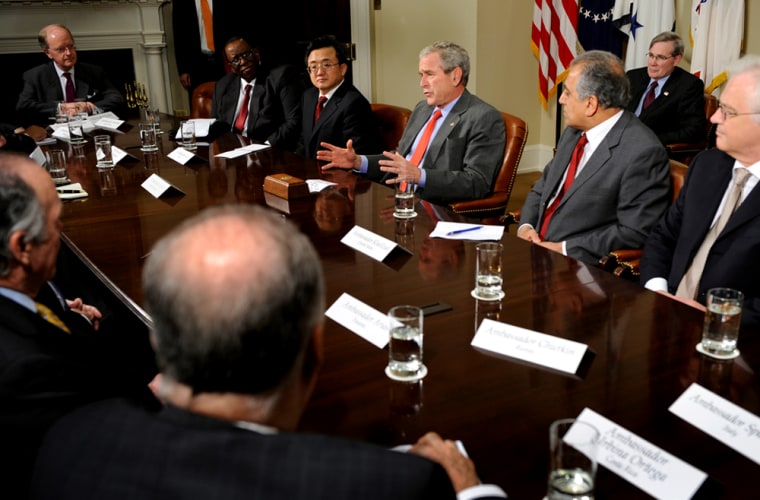A majority of U.N. Security Council member countries support a proposal to sanction Zimbabwe and freeze the assets of President Robert Mugabe, French and U.S. officials said Tuesday, but Russia warned it might veto the plan.
A vote on a U.S. draft resolution calling for sanctions over state-sanctioned election violence in Zimbabwe is expected later this week.
"Yes, we think" that nine of the council's 15 votes are behind the proposal, French Ambassador Jean-Maurice Ripert told reporters. "It's obvious there is global support for tougher measures."
"The votes are there for it to pass, absent a veto," echoed U.S. Ambassador Zalmay Khalilzad.
However, Russian Ambassador Vitaly Churkin warned that his nation could veto it. Russia is one of five council members with that power.
"We should be very careful about setting precedents," he said. "We should make it clear to begin with that the Security Council is not about to enter into the whole realm of mediating elections, or passing judgment on elections."
In Burkina Faso — a council member counted by supporters as the key ninth vote for sanctions — Zimbabwe's foreign minister said Tuesday that Mugabe is ready to form a unity government with the opposition. But Simbarashe Mumbengegwi remained vague on a role for the country's opposition leader, Morgan Tsvangirai.
Mumbengegwi said the way forward is for Mugabe to form "an all-inclusive government where all the political parties take part." He was in Ouagadougou, the capital of Burkina Faso, for a meeting with that nation's president.
'The principle of democracy is at stake'
The 15-nation council met Tuesday to discuss Zimbabwe. Ripert said Zimbabwe's crisis poses a threat to international peace and security, a requirement for the council's involvement, "due to the massive violation of human rights."
Deputy U.N. Secretary-General Asha-Rose Migiro, who was Tanzania's foreign minister until last year, provided some support for that view. Migiro, who just returned from an African Union summit, told the council that Mugabe's re-election has the potential to affect southern Africa's peace and security.
"The principle of democracy is at stake," she told the council.
The proposed U.N. sanctions include an international arms embargo and freeze on the personal assets of Mugabe and 11 other top government officials who the U.S. believes played a key role in using violence to undermine Mugabe's opposition.
The U.S., Britain and France, three of the council's veto-wielding members, pushed through nonbinding resolutions condemning election violence and intimidation against Zimbabwe's political opposition.
South Africa, Russia and the other council member with veto power, China, have opposed taking further action.
Russia and China — which is sensitive to its world image as the host of this summer's Olympic Games in Beijing — could abstain from council voting on a U.N. sanctions resolution. That would allow it to pass. China and South Africa, which led a fight to water down the two previous council statements on Zimbabwe, are Zimbabwe's biggest trading partners.
U.S. considers tougher sanctions
The United States is considering tougher unilateral sanctions by expanding the list of about 130 officials now banned from visiting the U.S. and hit with financial penalties.
The European Union and Australia also have imposed their own limited sanctions on Zimbabwe's government, and the EU likewise is studying whether to add to travel bans and an asset freeze already in place on Mugabe, his Cabinet ministers and top ruling party officials.
The United States and Europe also say opposition leader Morgan Tsvangirai should be Zimbabwe's next leader. Tsvangirai led Mugabe and two other candidates in the first presidential ballot March 29, but not by enough of a margin to avoid a runoff with Mugabe, who was second.
Mugabe has shown little sign of yielding power after 28 years as president. Despite international condemnation, he went ahead with a one-candidate election last month after Tsvangirai withdrew because of violence. Mugabe declared himself the winner and was inaugurated for a sixth term as president.
